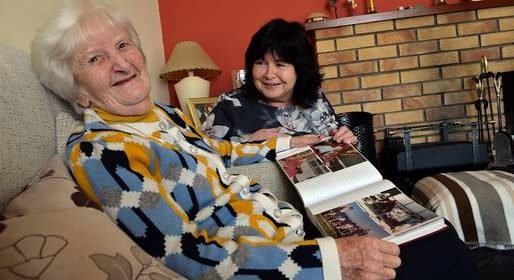'They make you feel like you are begging for Carer's Allowance'

A woman who looks after her elderly mother has told how the process of applying for Carer’s Allowance made her feel like she was “begging for this money”.
Margaret Healy (56), from Ballygar, Co Galway, said she never thought twice about giving up her career in childcare to care full-time for her mother Susan Fagan (89), who has Alzheimer’s.
However, she is now on less than half her old salary and struggles to find respite care to allow her to have a break.
“I remembered how mum cared for my siblings and I growing up, how she was there for me when I had my four children.
“I always promised mum I’d never put her in a care home, she hated the idea, so I did what I felt was right for her, I knew she’d be happier at home,” she explained.
Margaret, who is married to a retired garda, was means-tested for Carer’s Allowance. However, she said none of the family’s outgoings was taken into account – including their €800-a-month mortgage repayments and the cost of putting their son through college.
“My income went down by more than half, yet I was caring round the clock,” Margaret said.
“You feel like you’re begging for this money when, in fact, carers like me are saving the State billions of euro a year by not placing our loved ones into nursing homes or taking up hospital beds.
“You go through that fear where you half think it’ll be refused, even though you’re doing a good thing, a selfless thing, for your loved one, who needs care.
“I think the means-testing of carers in this situation is totally wrong. Carers have mortgages or rent to pay, bills, children to bring up and it’s so hard living off such a small amount and knowing you can’t even have much in the bank, or you’ll be cut down.
“And your partner’s salary or pension, or any property you have, is also counted against your Carer’s Allowance,” she said.
She said being a carer can be a “very isolating life”.
“It’s hard also because I can’t socialise as much as I’d like. People say they’ll visit and they don’t. You never see anyone unless you go to them, they feel they’re intruding. They aren’t.”
She said her mother had been on a waiting list for a day centre in Roscommon for two years. She has been approved for two weeks’ respite care a year.
“I feel it would make more sense for the HSE to send someone to care for her at home, where she’s happy.
“I will take the breaks because I desperately need them but I know when I come home I’ll have to calm mum and get her into a routine again at home.
“The Government could save more money by making it more viable to care for loved ones at home and to enable carers to still work and earn what they can.
“They could assist more carers with home help and pay carers a proper living wage to recognise the work and how much we save the healthcare system.”
A HSE spokesperson said one to two weeks per year was the “normal level of respite provided”. “Home support is a finite resource in terms of available budget … and would be unable to encompass all the respite currently being provided in Community Nursing Units.”
Source: Read Full Article